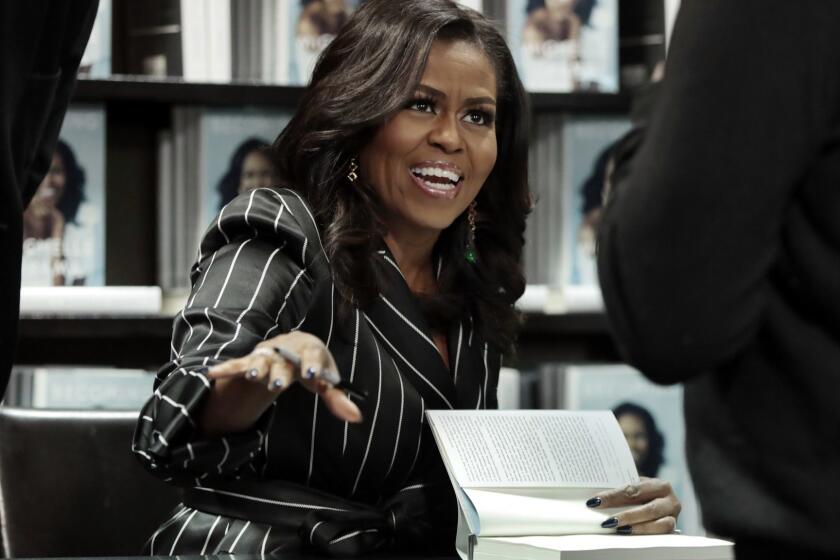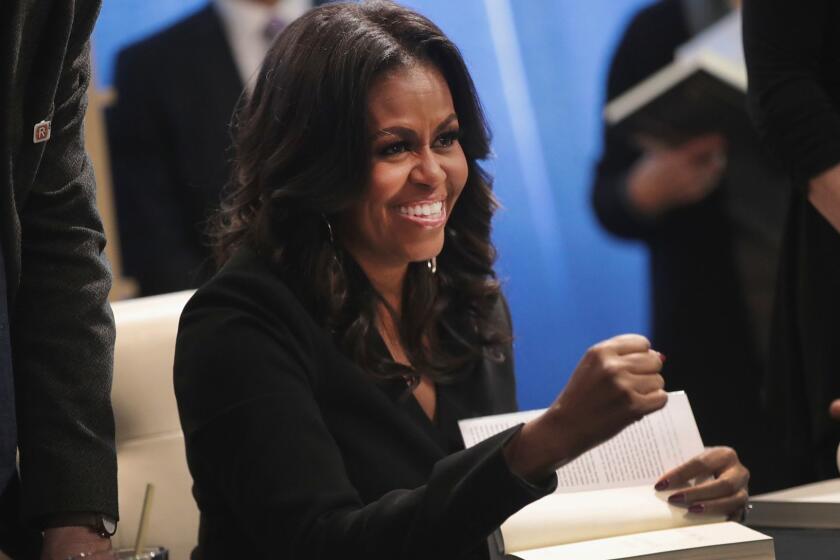Netflix’s ‘Becoming’ won’t change your mind about Michelle Obama
- Share via
How you experience “Becoming,” a new Netflix documentary about Michelle Obama, will largely depend on how you come to it. Are you for bridges or walls? An inclusive rather than exclusive society? Are you more likely to embrace difference or fear the other? Spring forward or fall back? Did you gnash your teeth through her husband’s presidency, or are you trying to stay sane through the current one? Do you read the sentence “Watching people half your intelligence being promoted past you, not because you’re not able, but because nobody thinks you deserve it” as arrogant, or an accurate reflection of the black and/or female experience in this country?
What are your feelings about the subject herself? Does the person exist who has no opinion of Michelle Obama? No one who is liable to watch this film, or read this review anyway.
My own inclination will be obvious, but to state the obvious, I was among those for whom one of the traumas of 2016 was that we would be seeing less of Michelle Obama. It seems perfectly understandable that we’re seeing calls for Joe Biden to make her his running mate, or for her to run for president herself.
Directed by Nadia Hallgren and produced by the former first couple’s Higher Ground Productions, which has already produced two Netflix documentaries, the Oscar-winning “American Factory” and “Crip Camp: A Disability Revolution,” it is an official product: authorized, certified — a statement rather than an investigation. A collection of recollections, exhortations and conversations, illustrated with family photos and woven through the former first lady’s arena-filling 2019 book tour, “Becoming” is best viewed as a companion to her memoir of the same name.
The former first lady is admired by liberals and conservatives. Putting her on the ticket would make defeating Trump easy.
That isn’t to say it’s bereft of self-examination, or an incendiary statement or two. (“I understand the people who voted for Trump,” she says, in a statement already picked up by the right-wing press. “The people who didn’t vote at all, the young people, the women — that’s when you think, man, people think this is a game.”) It takes you at least a step or two behind the scenes, which is as far as you’re ever going to get in any documentary nowadays; you can be a fly on the wall and still find some doors closed to you. Still, it feels honest, without oversharing. In a way, it’s a less provocative cousin to Madonna’s “Truth or Dare” — though I suppose there are people who will find Michelle Obama provocative just filing her nails — a film about public and private personas, about stardom and empowerment and intimate engagement with a crowd. Except there’s no diva in “Becoming.”
She’s funny, she’s physical. She is regal, in a particularly democratic, down-home way; signing copies of her book, she spends a moment speaking with each person who comes to the table, easily but with intention. (“Don’t look around, don’t look beyond them, look them in the eye, take in the story.”) She speaks of her support team as family, from chief of staff Melissa Winter, to stylist Michele Koop (“She’s no minimalist — when I look at this suit I do see Elvis,” says Koop, “and I don’t have a problem with that”), to the longtime head of her secret service detail, Allen Taylor. She took the White House domestic staff out of formalwear, because she didn’t want her daughters “to grow up thinking that grown African American men served them in tuxedos,” and made sure the housekeepers left her daughters to make their own beds.
The film, covering 56 years in 90 minutes, is a bit of a sampler, necessarily — a highlight (and low-light) reel of an extraordinary life. It reaches back to her childhood on the South Side of Chicago (“It was a typical working-class community, some good music, some good barbecue”) and continues through her school days (“A box checker, I was doing what I was supposed to do; I was an a student, I got the star”); meeting Barack Obama at the law firm where she was assigned to mentor him (he showed up late his first day); marriage, children and marriage counseling (“Let me stop being mad at him for going to the gym, and let me get to the gym”).
And so on to 2008, the Iowa caucuses, Millennium Park, the National Mall and “eight years of trying to do everything perfectly,” while being anatomized and magnified, celebrated and vilified and willfully misinterpreted, as when right-wing commentators characterized an ordinary (and pretty adorable) fist bump between the Obamas — the Healthier Handshake Alternative, we know now — as a “terrorist fist jab.” “Through the lies and the stuff they said about us, all we could do was wake up and do our jobs and let our jobs and our life speak for itself.,” Obama recalls.
James Baldwin wrote, “No one can possibly know what is about to happen: it is happening, each time, for the first time, for the only time.”
As close as she comes to what might be interpreted as a comment on Trump is when she points out that a president’s words are powerful, and with power comes, you know, responsibility. “You can start wars, you can crash economies, there’s too much power to be that careless. … The higher up you go, the higher up you have to be.”
Some would call this picture flattering — not unflattering, anyway — though it strikes me as a believable picture of a person who doesn’t need flattery, either to look good or to feel good about herself. To the extent that “Becoming” has something to sell, and it does, it’s not the subject so much as what she stands for. Among the backstage and onstage scenes, and a visit to a house where she grew up and lived with Barack for a while — where she sits down at a piano and plays a chorus of Vince Guaraldi’s “Linus and Lucy,” the film’s nicest surprise — are scenes in which she meets with small groups of students, or elders, or readers. On the page these can read like platitudes: “We can’t wait for the world to be equal to start feeling seen. … You’ve got to find the tools within yourself to feel visible and to be heard and to use your voice.” From the mouth of someone who lived it, spoken to a generation about to, it has force.
“I remain hopeful that people want better, if not for themselves then for the next generation,” Obama tells book event moderator Stephen Colbert in the film’s final moments. “And that is my basic joy. It gets back to mentoring others. That’s what I’m going to do until people are like, ‘OK, you done old lady.’ I’ll just be onstage in a wheelchair, just going, ‘And another thing!’ You know, and it’d be like, ‘Ooh, that little ol’ Michelle Obama, she’s still just talkin’.”
More to Read
The complete guide to home viewing
Get Screen Gab for everything about the TV shows and streaming movies everyone’s talking about.
You may occasionally receive promotional content from the Los Angeles Times.









